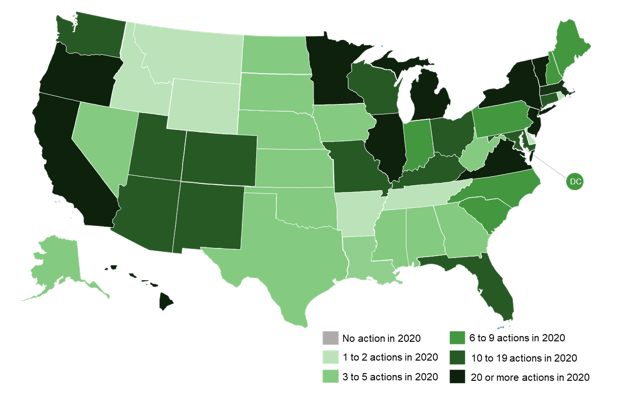The 50 States of Electric Vehicles: All 50 States Took Electric Vehicle Actions During 2020
Raleigh, NC – (February 11, 2021) The N.C. Clean Energy Technology Center (NCCETC) released its 2020 annual review and Q4 2020 update edition of The 50 States of Electric Vehicles. The quarterly series provides insights on state regulatory and legislative discussions and actions on electric vehicles and charging infrastructure.
The report finds that all 50 states and DC took actions related to electric vehicles and charging infrastructure during 2020 (see figure below), with the greatest number of actions relating to rebate programs, followed by charging station deployment, rate design, electric vehicle registration fees, and studies.
2020 State and Utility Action on Electric Vehicles

The report highlights ten of the top electric vehicle trends of 2020:
- Utilities filing expansive transportation electrification plans;
- Growing use of the make-ready infrastructure model;
- State policymakers adopting bold electric vehicle targets;
- Utilities proposing passive and active managed charging programs;
- Utilities committing to electrify their own fleets;
- Encouraging charging infrastructure development at multi-family buildings;
- Utilities developing off-peak charging bill credit programs;
- States and utilities offering additional incentives for low-income customers;
- States preparing electric vehicle roadmaps and infrastructure plans; and
- Utilities filing residential charger leasing pilot proposals.
“From approving a half a billion dollars in utility charging infrastructure investments to adopting goals to transition public and private vehicles to electric vehicles, policymakers took bold steps to electrify transportation in 2020,” said Brian Lips, Senior Policy Project Manager at NCCETC.
A total of 598 electric vehicle actions were taken during 2020, with activity related to rate design, financial incentives, and deployment increasing over 2019. The report notes the top ten states taking the greatest number or most impactful actions in 2020 were New Jersey, California, New York, Minnesota, Colorado, Wisconsin, Connecticut, New Mexico, Oregon, and Hawaii.
“One of the biggest issues in transportation electrification continues to be what role utilities should play,” observed Autumn Proudlove, Senior Policy Program Director at NCCETC. “Although states continue to explore different approaches, we saw movement toward the make-ready infrastructure model in 2020.”
In Q4 2020, 43 states and DC took some type of action on electric vehicles and charging infrastructure. A total of 270 actions were tracked in Q4.
View the 50 States of Electric Vehicles 2020 Annual Review and Q4 Update Executive Summary
View and Purchase the 50 States of Electric Vehicles 2020 Annual Review and Q4 Update FULL Report
View other 50 States Reports – Solar, Grid Modernization and Electric Vehicles
ABOUT THE N.C. CLEAN ENERGY TECHNOLOGY CENTER
The N.C. Clean Energy Technology Center, as part of the College of Engineering at North Carolina State University, advances a sustainable energy economy by educating, demonstrating and providing support for clean energy technologies, practices and policies. It serves as a resource for innovative, sustainable energy technologies through technology demonstration, technical assistance, outreach and training. For more information about the Center, visit: http://www.nccleantech.
Media Contact: Shannon Helm, NCCETC, shannon_helm@ncsu.edu